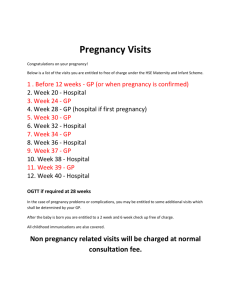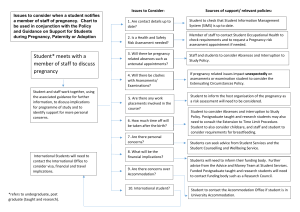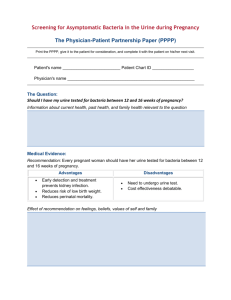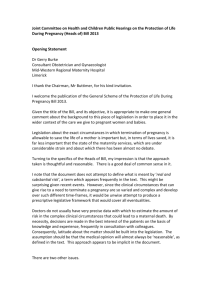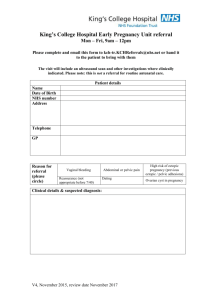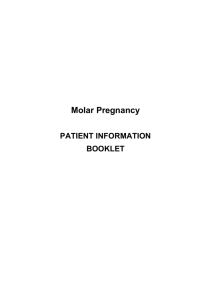ANAESTHESIA FOR CAESARIAN SECTION
advertisement
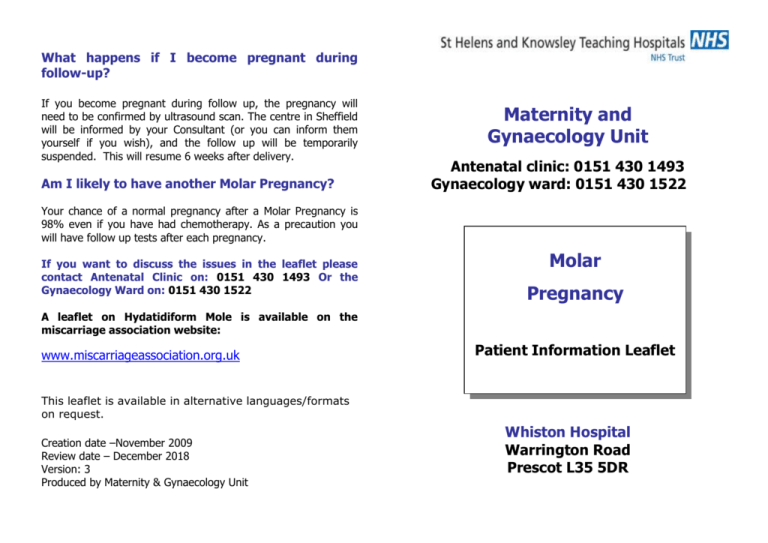
What happens if I become pregnant during follow-up? If you become pregnant during follow up, the pregnancy will need to be confirmed by ultrasound scan. The centre in Sheffield will be informed by your Consultant (or you can inform them yourself if you wish), and the follow up will be temporarily suspended. This will resume 6 weeks after delivery. Am I likely to have another Molar Pregnancy? Maternity and Gynaecology Unit Antenatal clinic: 0151 430 1493 Gynaecology ward: 0151 430 1522 Your chance of a normal pregnancy after a Molar Pregnancy is 98% even if you have had chemotherapy. As a precaution you will have follow up tests after each pregnancy. If you want to discuss the issues in the leaflet please contact Antenatal Clinic on: 0151 430 1493 Or the Gynaecology Ward on: 0151 430 1522 Molar Pregnancy A leaflet on Hydatidiform Mole is available on the miscarriage association website: www.miscarriageassociation.org.uk Patient Information Leaflet This leaflet is available in alternative languages/formats on request. Creation date –November 2009 Review date – December 2018 Version: 3 Produced by Maternity & Gynaecology Unit Whiston Hospital Warrington Road Prescot L35 5DR What is a Molar Pregnancy? A molar pregnancy is a disorder in which there is an overgrowth of the cells which would normally form the placenta (afterbirth), and usually the baby fails to develop. It may also be called ‘Trophoblastic Disease’ or ‘Hydatidiform Mole’ which affects 1 pregnancy in 1500. A period of follow up is advised after a Molar pregnancy because there is a small risk of the molar tissue continuing to grow and possibly spreading to other parts of the body, even though you may feel perfectly well in yourself. How is a molar pregnancy diagnosed? You may experience bleeding in early pregnancy and an ultrasound examination may result in the diagnosis being suspected. The diagnosis is confirmed after a miscarriage or evacuation of the uterus when tissue from the womb is sent to the laboratory for examination under a microscope. What treatment will be required? You will usually have at least one minor operation to enable evacuation of the uterus, sometimes known as an Evacuation of Retained Products of Conception (ERPC), to ensure that all the Molar Pregnancy has been removed from your womb. (Scrape) This tissue is sent to the laboratory for examination. You will be asked to sign a consent form agreeing to this. Because it is a very rare condition, there are only 3 national centres which monitor women who have had a Molar Pregnancy. In most cases you are followed up by the Sheffield Centre, although you do not actually need to go to Sheffield. Your urine and blood samples are sent there for analysis. In 1 in 5 cases the evacuation of the uterus does not remove all of the Molar Pregnancy and in this case you will require chemotherapy (drug treatment). How will I be followed up? Follow-up involves measuring the levels of the pregnancy hormone called Human Chorionic Gonadatrophin (HCG), in urine samples and occasionally in the blood. Pre-paid boxes are provided for you to post your samples to the screening centre, including full instructions on how to collect the urine samples. At first you will be asked to send a sample of urine every week. From time to time the interval will be increased and every so often you will be asked for a blood test which will be taken at your local hospital. If the HCG levels fall quickly you will need to be followed up for only 6 months, otherwise it may be for longer. When can I try for another baby? You will be advised not to become pregnant during follow-up as it makes it difficult for the screening centre to monitor your progress properly. The coil Intrauterine Contraceptive device (IUCD) is not recommended as it may cause irregular bleeding. You may use oral contraceptives after your operation, please discuss this with your doctor. Continued overleaf … 2 1

